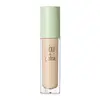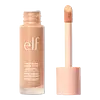What's inside
What's inside
 Key Ingredients
Key Ingredients

 Benefits
Benefits

 Concerns
Concerns

 Ingredients Side-by-side
Ingredients Side-by-side

Water
Skin ConditioningDimethicone
EmollientCyclopentasiloxane
EmollientDimethicone Crosspolymer
Emulsion StabilisingPhenyl Trimethicone
Skin ConditioningIsododecane
EmollientIsobutyl Methacrylate
Ethylhexyl Palmitate
EmollientQuaternium-90 Bentonite
Propylene Carbonate
SolventButylene Glycol
HumectantPolymethylsilsesquioxane
Cetyl PEG/PPG-10/1 Dimethicone
EmulsifyingHydrogenated Castor Oil
EmollientSilica
AbrasiveSorbitan Sesquioleate
EmulsifyingSodium Chloride
MaskingPhenoxyethanol
PreservativeEthylhexylglycerin
Skin ConditioningTriethylhexanoin
MaskingPolyglyceryl-4 Isostearate
EmulsifyingHexyl Laurate
EmollientLecithin
EmollientPolyhydroxystearic Acid
EmulsifyingIsopropyl Myristate
EmollientIsostearic Acid
CleansingPolyglyceryl-3 Polyricinoleate
EmulsifyingTocopheryl Acetate
AntioxidantPentaerythrityl Tetra-Di-T-Butyl Hydroxyhydrocinnamate
AntioxidantRosa Rubiginosa Seed Oil
EmollientCaprylic/Capric Triglyceride
MaskingCamellia Sinensis Leaf Extract
AntimicrobialCI 77891
Cosmetic ColorantIron Oxides
Water, Dimethicone, Cyclopentasiloxane, Dimethicone Crosspolymer, Phenyl Trimethicone, Isododecane, Isobutyl Methacrylate, Ethylhexyl Palmitate, Quaternium-90 Bentonite, Propylene Carbonate, Butylene Glycol, Polymethylsilsesquioxane, Cetyl PEG/PPG-10/1 Dimethicone, Hydrogenated Castor Oil, Silica, Sorbitan Sesquioleate, Sodium Chloride, Phenoxyethanol, Ethylhexylglycerin, Triethylhexanoin, Polyglyceryl-4 Isostearate, Hexyl Laurate, Lecithin, Polyhydroxystearic Acid, Isopropyl Myristate, Isostearic Acid, Polyglyceryl-3 Polyricinoleate, Tocopheryl Acetate, Pentaerythrityl Tetra-Di-T-Butyl Hydroxyhydrocinnamate, Rosa Rubiginosa Seed Oil, Caprylic/Capric Triglyceride, Camellia Sinensis Leaf Extract, CI 77891, Iron Oxides
Water
Skin ConditioningHydrogenated Didecene
Skin ConditioningSqualane
EmollientPropylene Glycol
HumectantGlycerin
HumectantOctyldodecanol
EmollientCetyl PEG/PPG-10/1 Dimethicone
EmulsifyingDimethicone
EmollientPolyglyceryl-4 Isostearate
EmulsifyingSynthetic Fluorphlogopite
Isoamyl Laurate
EmollientHydrogenated Styrene/Isoprene Copolymer
Ethylhexyl Hydroxystearate
EmollientSodium Chloride
MaskingPhenoxyethanol
PreservativeCaprylic/Capric Triglyceride
MaskingDisteardimonium Hectorite
StabilisingPropylene Carbonate
SolventEthylhexylglycerin
Skin ConditioningCaprylyl Glycol
EmollientHelianthus Annuus Seed Oil
EmollientAluminum Hydroxide
EmollientHydrolyzed Sodium Hyaluronate
Skin ConditioningSodium Hyaluronate
HumectantDisodium EDTA
Tocopherol
AntioxidantTriethoxycaprylylsilane
Polymethylsilsesquioxane
Calendula Officinalis Flower Extract
MaskingTin Oxide
AbrasivePentaerythrityl Tetra-Di-T-Butyl Hydroxyhydrocinnamate
AntioxidantCI 77891
Cosmetic ColorantCI 77492
Cosmetic ColorantCI 77491
Cosmetic ColorantCI 77499
Cosmetic ColorantCI 77163
Cosmetic ColorantWater, Hydrogenated Didecene, Squalane, Propylene Glycol, Glycerin, Octyldodecanol, Cetyl PEG/PPG-10/1 Dimethicone, Dimethicone, Polyglyceryl-4 Isostearate, Synthetic Fluorphlogopite, Isoamyl Laurate, Hydrogenated Styrene/Isoprene Copolymer, Ethylhexyl Hydroxystearate, Sodium Chloride, Phenoxyethanol, Caprylic/Capric Triglyceride, Disteardimonium Hectorite, Propylene Carbonate, Ethylhexylglycerin, Caprylyl Glycol, Helianthus Annuus Seed Oil, Aluminum Hydroxide, Hydrolyzed Sodium Hyaluronate, Sodium Hyaluronate, Disodium EDTA, Tocopherol, Triethoxycaprylylsilane, Polymethylsilsesquioxane, Calendula Officinalis Flower Extract, Tin Oxide, Pentaerythrityl Tetra-Di-T-Butyl Hydroxyhydrocinnamate, CI 77891, CI 77492, CI 77491, CI 77499, CI 77163
 Reviews
Reviews

Ingredients Explained
These ingredients are found in both products.
Ingredients higher up in an ingredient list are typically present in a larger amount.
This ingredient is an emollient, solvent, and texture enhancer. It is considered a skin-softener by helping the skin prevent moisture loss.
It helps thicken a product's formula and makes it easier to spread by dissolving clumping compounds.
Caprylic Triglyceride is made by combining glycerin with coconut oil, forming a clear liquid.
While there is an assumption Caprylic Triglyceride can clog pores due to it being derived from coconut oil, there is no research supporting this.
Learn more about Caprylic/Capric TriglycerideThis ingredient is a high molecular weight silicone. It has emulsifying and skin conditioning properties.
Ci 77891 is a white pigment from Titanium dioxide. It is naturally found in minerals such as rutile and ilmenite.
It's main function is to add a white color to cosmetics. It can also be mixed with other colors to create different shades.
Ci 77891 is commonly found in sunscreens due to its ability to block UV rays.
Learn more about CI 77891Dimethicone is a type of synthetic silicone created from natural materials such as quartz.
What it does:
Dimethicone comes in different viscosities:
Depending on the viscosity, dimethicone has different properties.
Ingredients lists don't always show which type is used, so we recommend reaching out to the brand if you have questions about the viscosity.
This ingredient is unlikely to cause irritation because it does not get absorbed into skin. However, people with silicone allergies should be careful about using this ingredient.
Note: Dimethicone may contribute to pilling. This is because it is not oil or water soluble, so pilling may occur when layered with products. When mixed with heavy oils in a formula, the outcome is also quite greasy.
Learn more about DimethiconeEthylhexylglycerin (we can't pronounce this either) is commonly used as a preservative and skin softener. It is derived from glyceryl.
You might see Ethylhexylglycerin often paired with other preservatives such as phenoxyethanol. Ethylhexylglycerin has been found to increase the effectiveness of these other preservatives.
Pentaerythrityl Tetra-Di-T-Butyl Hydroxyhydrocinnamate (long name, huh?) is a synthetic antioxidant.
It is used to help stabilize other antioxidants or prevent the color from changing in a product.
As an antioxidant, it helps fight free-radical molecules. Free-radical molecules are capable of damaging our cells and other genetic material. Thus, antioxidants may reduce the signs of aging.
This ingredient is oil-soluble.
Learn more about Pentaerythrityl Tetra-Di-T-Butyl HydroxyhydrocinnamatePhenoxyethanol is a preservative that has germicide, antimicrobial, and aromatic properties. Studies show that phenoxyethanol can prevent microbial growth. By itself, it has a scent that is similar to that of a rose.
It's often used in formulations along with Caprylyl Glycol to preserve the shelf life of products.
This ingredient is an emulsifer and stabilizer. It comes from isostearic acid and polyglycerin.
As an emulsifier, it helps blend oil and water to improve texture, spreadbility, and application.
Due to it being derived from isostearic acid, this ingredient may not be fungal acne safe.
Learn more about Polyglyceryl-4 IsostearatePolymethylsilsesquioxane is a silicone used as a film forming agent.
When applied to the skin, this ingredient creates an invisible film on the surface. This film still allows oxygen to pass through, but prevents moisture from escaping. This can help condition and hydrate the skin. It also leaves a silky feel when applied.
Polymethylsilsesquioxane has not been shown to clog pores. It has been deemed safe to use up to 55%, but most cosmetics use much less.
If you have concerns about using this ingredient, we recommend speaking with a professional.
Learn more about PolymethylsilsesquioxaneThis ingredient is a solvent. It helps dissolve active ingredients and alter the texture of products.
Propylene Carbonate is commonly used in makeup and with clay, such as montmorillonite or bentonite.
Studies show this ingredient to be safe for cosmetics. When it is undiluted, it can cause skin irritation. (It is always diluted in skincare and makeup). This ingredient is water-soluble.
Propylene Carbonate is created from propylene glycol and carbonic acid.
Learn more about Propylene CarbonateChances are, you eat sodium chloride every day. Sodium Chloride is also known as table salt.
This ingredient has many purposes in skincare: thickener, emulsifier, and exfoliator.
You'll most likely find this ingredient in cleansers where it is used to create a gel-like texture. As an emulsifier, it also prevents ingredients from separating.
There is much debate on whether this ingredient is comedogenic. The short answer - comedogenic ratings don't tell the whole story. Learn more about comegodenic ratings here.
The concensus about this ingredient causing acne seems to be divided. Research is needed to understand if this ingredient does cause acne.
Scrubs may use salt as the primary exfoliating ingredient.
Learn more about Sodium ChlorideWater. It's the most common cosmetic ingredient of all. You'll usually see it at the top of ingredient lists, meaning that it makes up the largest part of the product.
So why is it so popular? Water most often acts as a solvent - this means that it helps dissolve other ingredients into the formulation.
You'll also recognize water as that liquid we all need to stay alive. If you see this, drink a glass of water. Stay hydrated!
Learn more about Water